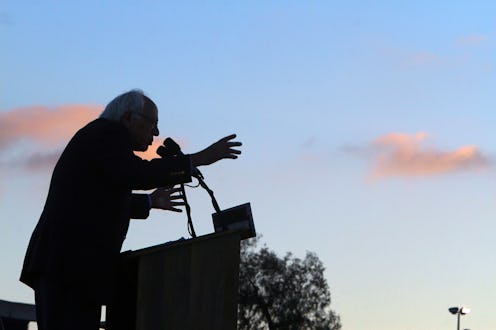News
This Bernie Sanders Wish Might Still Come True
Sen. Bernie Sanders entered the crucial June 7 primaries nearly 300 pledged delegates behind Sec. Hillary Clinton, a gap he could not close. Sanders and his supporters were still holding out for a possible comeback, and Sanders' campaign repeatedly floated the idea of relying on superdelegates to tip the Democratic nomination in his favor. But winning the nomination wasn't the only goal Sanders had. After a series of losses at the end of April, Sanders announced another mission in a statement: "to fight for a progressive party platform." Will Sanders change the Democratic Party?
The official party platform will be shaped at the Democratic National Convention in July. Usually, the chair of the Democratic National Committee (currently Debbie Wasserman Schultz) selects all 15 members of the platform committee. But in an unprecedented move, presumably to alleviate some of the disdain coming from Sanders supporters, party leaders decided to allow Clinton and Sanders to each select platform committee members according to their share of the popular vote in the primaries through May 23. Sanders selected five members, Clinton selected six, and Wasserman Schultz chose the remaining four. Sanders' progressive picks included Cornel West, the famed racial justice activist, and Palestinian rights activist James Zogby.
Sanders has some lofty goals for the Democratic Party platform, and it remains to be seen how many — if any — of those goals will be achieved by the inclusion of his selected committee members. Sanders' aspirations for the platform include breaking up big banks, instituting a carbon tax, and single-payer health care, The Washington Post reported.
The 2016 primary season has simultaneously inspired citizens to enter the political process and left many feeling embittered and estranged from it, both likely due to the presence of outsider candidates on the right and left. Sanders has performed strongly among independents, young people, and first-time voters (demographics that admit of overlap), igniting interest in the election among people who believe that the Democratic Party, and its presumptive nominee Hillary Clinton, are not progressive enough. According to a McClatchy-Marist poll, about one quarter of Sanders supporters have said they will not vote for Clinton should she be the nominee, indicating that their allegiance to the Democratic Party hinges not necessarily on Sanders himself, but on the progressive policies for which he stands.
Therefore, the Democratic Party can only expect to incorporate more people into the fold — and possibly prevent losing some who are already in it — by accommodating, at least to some extent, the more progressive policies advanced by Sanders. Though Sanders has not won a majority of the popular vote, the fact that such a supposed long-shot candidate has been able to perform as well as he has in the 2016 primaries indicates that the progressive force is strong among the U.S. electorate, even if not quite the new norm.
Not everyone is convinced the Democratic Party is capable of becoming more progressive — or, at least, progressive enough to suit their demands. Green Party presidential candidate Jill Stein penned a letter to Sanders asking him to join forces with the the third party, referring to the Democratic Party as a "corporate political machine" that "mobilizes to quash revolution in its ranks."
The question is not only whether Sanders will have any real influence over the party platform; it's also whether it'll represent a sufficient progressive shift in the eyes of Sanders supporters. Of course, if that happened, it would disaffect more moderate Democrats. But it would open the party up to the now-largest generation, millennials, who skew progressive on the issues. And that would be a real victory for Sanders and his supporters.
